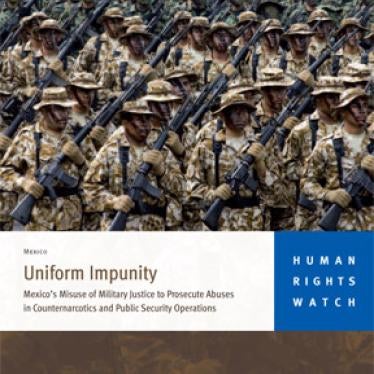Thank you, Mr. President.
Mr. Despouy,
Center Prodh, Human Rights Watch, The International Commission of Jurists and The World Organization Against Torture would like to thank you for your March 2009 report to this Council, in which you highlight the considerable attention that you have given to the subject of military jurisdiction and point to the Draft Principles on the Administration of Justice by Military Tribunals, which are yet to be adopted by the Council.
Such Principles state that "in all circumstances, the jurisdiction of military courts should be set aside in favor of the jurisdiction of the ordinary courts to conduct inquiries into serious human rights violations such as extrajudicial executions, enforced disappearances and torture, and to prosecute and try persons accused of such crimes."
We wish to bring to your attention that, despite the fact that international human rights bodies have consistently rejected the use of military prosecutors and courts in cases involving abuses against civilians, by stating that the jurisdiction of military courts should be limited to offenses that are strictly military in nature, Mexican military prosecutors and courts continue to routinely investigate members of the military accused of committing human rights violations. This practice violates Mexico's obligations under international law and appears to contravene Article 13 of Mexico's Constitution.
Since President Calderon took office in December 2006 and deployed thousands of troops to combat drug trafficking and organized crime, complaints of military abuses reported to Mexico's National Human Rights Commission have increased by six hundred per cent.
Impunity for these abuses is the norm. The Mexican military routinely investigates even the most egregious human rights violations, including alleged rapes, killings, arbitrary detentions, and torture, through a system that lacks basic safeguards to ensure independence and impartiality. In the past two years, the Mexico's Military Attorney General reported to have only made indictments in less than ten per cent of the cases presented to it that involved crimes by soldiers against civilians. And he has been unable to provide a single example in the last ten years in which a member of the military accused of committing a human rights violation was convicted by military courts.
In the context of Mexico's Universal Periodic Review in February 2009, seven States recommended that Mexico properly limit the use of military jurisdiction to exclude human rights crimes from its sphere of competence. These recommendations were not accepted and remained pending upon the consideration by the Mexican Government.
In light of the situation in Mexico with regard to the use of military justice, which causes us great concern, and following up on the body of work that you have carried out on this important issue, including your report to the sixty-first session of the General Assembly on the situation of military justice in the world (A/61/384), what measures, including a country visit to Mexico, would you consider feasible to address this urgent issues?
The International Commission of Jurists, Center Prodh, Human Rights Watch and the OMCT would like to take this opportunity to acknowledge your important work as Special Rapporteur on the Independence of Judges and Lawyers.
I thank you.







